| Srl | Item |
| 1 |
ID:
089809
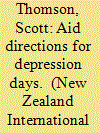

|
|
|
|
|
| Publication |
2009.
|
| Summary/Abstract |
The ortigin of NZAID lie in the need for expertise, experience, continuity and accountability in aid provision, These had been difficult to achieve under the old arrangements focused on the Ministry of Foreign Affairs' Aid Division. Most diplomats viewed aid work as a temporary distraction from diplomatic postings, not as a career choice. The establishment of a career service was designed to rectify this situation, rather than to ensure a political compromise in 2002. In aid provision there are no quich fixes.Fifty years of experience has shown how hard it is to generate life enhancing economic activity in the pacific islands. The government should tread warily in the field, and should not ignore voluntary sector experience. This article cricises the government's new approach to aid provision.
|
|
|
|
|
|
|
|
|
|
|
|
|
|
|
|
| 2 |
ID:
147302
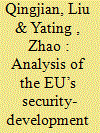

|
|
|
|
|
| Summary/Abstract |
With the security situation in Africa looking pessimistic since the beginning of the 21st century, the EU has adjusted its ODA policy in Africa by linking it to security issues. The EU has been carrying out a number of security-development aid projects and these have seen some positive results. However, shortcomings have been identified . Even so, it is of historic significance that African nations are working more closely with the EU in the areas of security and aid under the framework of Agenda 2063.
|
|
|
|
|
|
|
|
|
|
|
|
|
|
|
|
| 3 |
ID:
083211
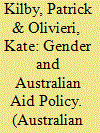

|
|
|
|
|
| Publication |
2008.
|
| Summary/Abstract |
The issue of gender and development has been an important part of the development discourse since the Mexico City Women Conference in 1973. This concern has been very slow to transform itself into policy. For development agencies including AusAID it has been a subsidiary policy area or an add-on, as a recipe might say'add women and stir'. The White Paper of 2007 brought gender to the centre of policy as an overarching principle. The question that arises is the extent to which these policies fit into or are driven by the neo-liberal paradigm underpinning the aid program, or if these policies can challenge it by positing a rights agenda. The 2007 Gender policy tries to sit between the two in that it focuses on the economic role that women can play in fostering growth on the one hand, and the denial of human rights that marginalisation and disempowerment represents. This paper will explore the development of gender policy in AusAID, and compare it with the development of policy of other agencies that follow the neo-liberal framework in particular the World Bank and ADB. Finally the paper will make some suggestions for the new Labor government to strengthen the Policy
|
|
|
|
|
|
|
|
|
|
|
|
|
|
|
|
| 4 |
ID:
145404
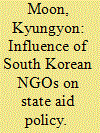

|
|
|
|
|
| Summary/Abstract |
I examine the experiences of South Korean nongovernmental organizations (NGOs) that provide aid to North Korea in order to assess the success and limitations of the NGO movement. With reference to the political role of NGOs in constructivist theory, I identify three factors that have hindered the formation of a sustainable partnership between the South Korean government and NGOs since the inter-Korean summit of 2000. First, South Korean NGOs have lacked consistent efforts toward transparency and accountability in operations and organizational management. Second, the great increase in inter-Korean cooperation and exchange after 2000 weakened the research, education, and advocacy function of NGOs. Third, aid NGOs failed to establish independent, diversified, and stable funding mechanisms, decreasing their capacity to act as cooperative partners of the government.
|
|
|
|
|
|
|
|
|
|
|
|
|
|
|
|
| 5 |
ID:
089807
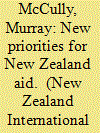

|
|
|
|
|
| Publication |
2009.
|
| Summary/Abstract |
Since the election the government has reviewed the existing approach to aid delivery and has determined to make substantial changes both to the structure of New Zealand's aid organisation and in the priorities governing the provision of aid. This article outlines the thinking of the National-led government in relation to the procvision an delivery of overseas aid.
|
|
|
|
|
|
|
|
|
|
|
|
|
|
|
|
| 6 |
ID:
123522
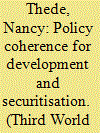

|
|
|
|
|
| Publication |
2013.
|
| Summary/Abstract |
Often treated as separate paradigms, the security-development nexus and the aid effectiveness agenda are analysed here instead as a continuum of aid policy responses that attempt to stabilise power relations in a contested and unstable international arena These responses are informed by a common commitment by western donor governments to neoliberal logic since the early 1980s. The article focuses on the discourse of policy coherence for development promoted by the DAC (Development Assistance Committee) of the OECD (Organisation for Economic Cooperation and Development), analysing it as the common vector of the two dimensions - effectiveness and security - of donor aid policy. By examining the emergence and transformations of the concept of coherence over the past two decades, it underlines the predominance of continuity over rupture in three successive phases of stabilisation (economic, political, security).
|
|
|
|
|
|
|
|
|
|
|
|
|
|
|
|
| 7 |
ID:
180013
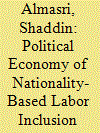

|
|
|
|
|
| Summary/Abstract |
In a setting of protracted refugee crises, donor responses increasingly have taken on experimental development approaches. One such aid experiment is that of the Jordan Compact, drafted in February 2016. This aimed to turn the Syrian refugee crisis in Jordan into a development opportunity, by fostering job creation and harvesting skills of displaced populations. This brought with it attention from donors in the form of political interest and, more importantly, funding, to stimulate the local economy and labor markets. However, the implementation of this plan was problematic: It focused only on stimulating jobs for Syrians and Jordanians, with little attention given to existing labor market dynamics and other employed nationality groups. Using a qualitative approach informed by both desk research and key informant interviews, this article shows that the policies undertaken have formed a nationality-based prioritization strategy that sought to improve Syrian labor market access over that of other non-Jordanians. The Compact did little to address genuine job creation or social protection, focusing on boosting permit numbers while worsening non-Syrian migrant and refugee access to protection in formal work.
|
|
|
|
|
|
|
|
|
|
|
|
|
|
|
|
| 8 |
ID:
164576
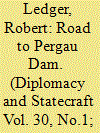

|
|
|
|
|
| Summary/Abstract |
This analysis charts the changes in British aid policy under the Margaret Thatcher government (1979–1990). In particular, it examines the impact of so-called neo-liberal ideology in overseas development strategy in an era where “structural adjustment”—aid in return for market-based reforms—became World Bank and International Monetary Fund orthodoxy. There is some evidence to show British increases in multilateral aid during the 1980s supported a neo-liberal aid policy. Bilateral aid policy, however, demonstrated a subordination of aid to foreign policy and a pro-business—not ideologically pro-market or neo-liberal—alignment. One of the results of these structural changes was the Pergau Dam scandal at the end of the Thatcher years.
|
|
|
|
|
|
|
|
|
|
|
|
|
|
|
|
| 9 |
ID:
094603
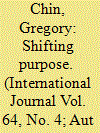

|
|
|